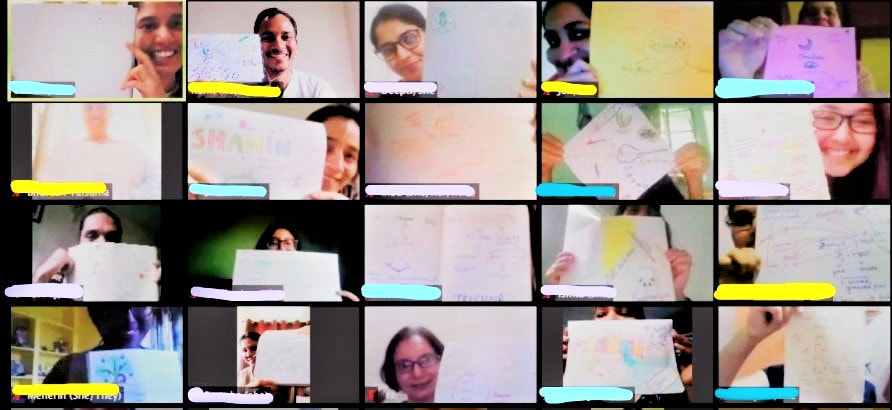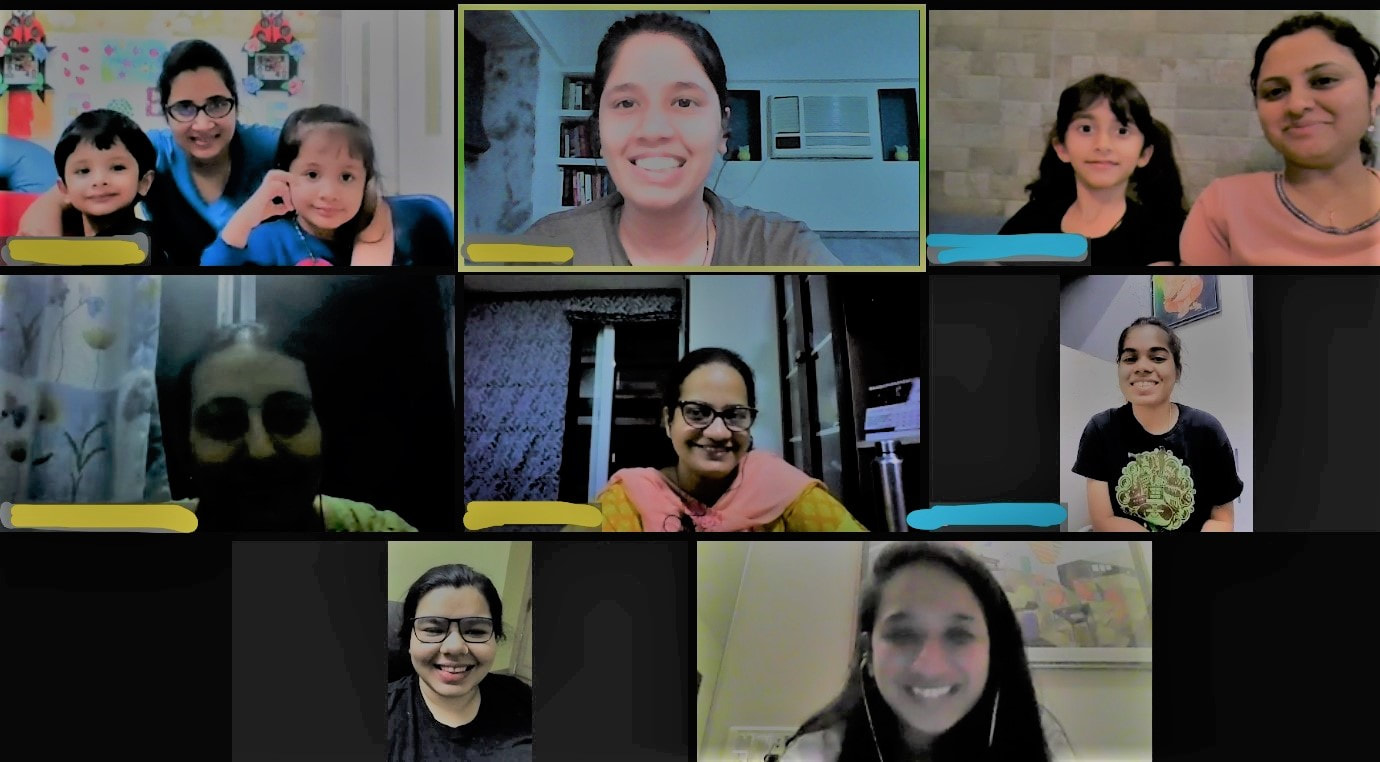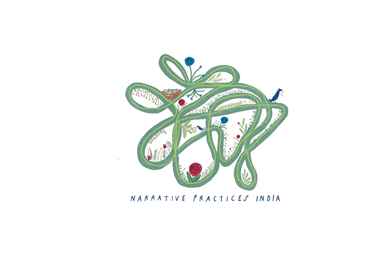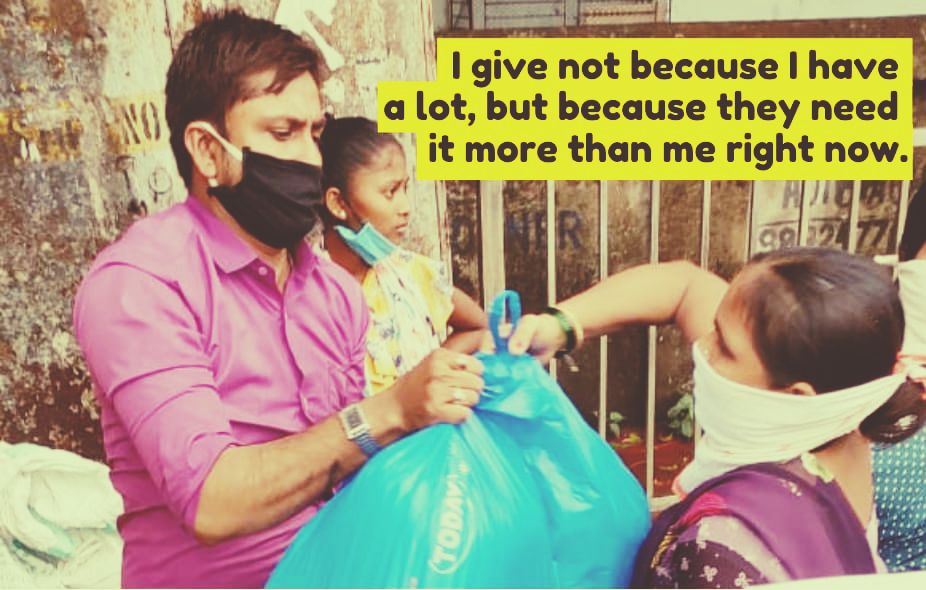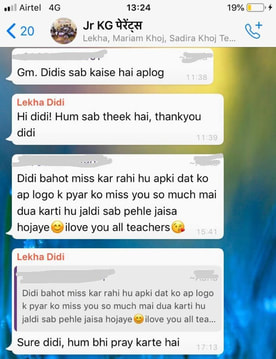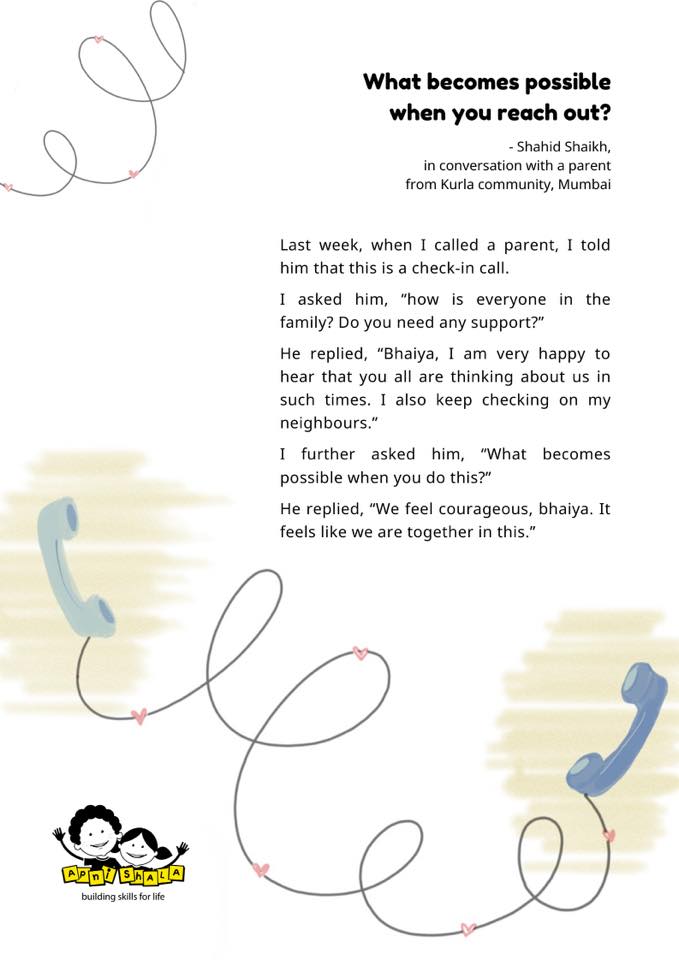Communities of Wellbeing
Emotional Wellbeing Support Project during the 2nd wave of COVID-19
This initiative has now completed and closed.
This initiative has now completed and closed.
At this difficult time, we came together to...
Process our distress, grief, anxiousness, anger, sadness, and other emotions |
Find people with shared experiences and learn from each other |
Learn tools and strategies to navigate through these times |
The COVID-19 second wave has disrupted lives in communities across India. We extend support by creating safe and open spaces where people (adults, children, youth) can come together to express their feelings, build solidarity through their shared experiences, and co-create spaces of community wellbeing to overcome the challenges that this phase presents.
Attend any of these 3 online wellbeing spaces (on Zoom)
Sessions for Adults (ages 18+)
Day/TimeSaturdays 4:00 PM - 5:30 PM IST
Session LinksClick to join a bilingual session (English and Hindi) क्लिक करें अंग्रेजी और हिंदी में सेशन जॉइन करने के लिए। Meeting ID: 837 9141 6210 Passcode: wellbeing मराठीत सहभागी होण्यासाठी येथे क्लिक करा | Meeting ID: 916 2673 7064 Passcode: wellbeing Sessions for Teens / Youth (ages 13-17)
Day/TimeEvery Wednesday, 4:00-5:30pm IST
Session LinksClick to join the bilingual (English and Hindi) session क्लिक करें अंग्रेजी और हिंदी में सेशन जॉइन करने के लिए। Meeting ID: 837 9141 6210 Passcode: wellbeing Let's come together to build solidarity through shared experiences.
Why is this important?
COVID-19 second wave is proving to be extremely challenging for India. While challenges around medical facilities and infrastructure have made matters worse, the complex situation has given rise to acute emotional distress. Social media, news channels, and family groups are abuzz with frustration and helplessness. Whether it is people who are experiencing COVID, frontline workers who are providing support, caregivers and family members of COVID patients, or children who are seeing all this unfolding this painful sadness in front of them, the anxiety and burnout are at an all-time high. Read more about how this devastating second wave is impacting our mental health |
Sessions for Children (ages 4-12)
Day/TimeEvery Friday 6:45 pm to 7:45 pm IST
Session LinksAnyone and everyone can attend.
LanguageThe spaces will be offered in three separate language groups, English, Marathi, and Hindi to reach linguistically diverse participants.
Pay what you canThe fee for participation in this project is voluntary and “pay what you can”. The per-person cost is INR 500 / session. You are welcome to pay any amount you choose/can. You can also pay it forward, to create access for wellbeing for those who may not be able to pay. All payments are received as a donation to our wellbeing support initiatives and you can make a donation using this link.
|
For any queries on these sessions, write to |
What else are we doing to support communities?
We continue to work with children and caregivers from marginalised communities in L ward, M-west and M-east wards of Mumbai, three of the least developed wards, through call-based support
Help us support people in crisis. Donate to our fundraiser.
Supporting the Emotional Wellbeing of children and caregivers affected by the second wave of COVID-19 pandemic.
We thank our partners ...
|
|
|
Our mental wellbeing work is informed by Narrative Practices, a postmodern therapy practice, and Mindfulness. Apni Shala’s focus is on promotive and preventive mental health. In this initiative, the team is supported by Narrative Practices India (NPI) for ongoing support to the facilitating team.
|
Our outreach partners are supporting this initiative in a variety of ways such as creating support pathways and resources, creating access for wellbeing to diverse communities, and building larger outreach. We are grateful to have Atma, The Yellow Umbrella and Catalyst for Social Action to be our outreach partners in this initiative.
|
Our first response to the crisis in April 2020
The spread of COVID-19 has significantly pronounced the need for addressing the mental health needs of individuals, particularly children and caregivers in marginalized and low-income communities. With the spread of the virus in slum communities, loss of income and job opportunities, being locked in small home spaces, many time with difficult family situations, the life situations of many young children and their caregivers have become grim with rising fear, anxiety and inability to manage complex emotions in such ambiguous times.
The intersectionality of poverty and mental health is well-documented. Lower mental health and higher stress has also been linked to decreased immunity, hence increasing the probability of infection.
The intersectionality of poverty and mental health is well-documented. Lower mental health and higher stress has also been linked to decreased immunity, hence increasing the probability of infection.
Care in times of COVID-19
This report from the ground gives us a glimpse into the relief work we did when COVID-19 hit Mumbai.
Our Response during the Crisis
In response to this crisis, the following projects were undertaken to improve the mental wellbeing of the communities we serve and beneficiaries at large:
Develop age-appropriate, audience-relevant Mental Health resources
- Resources developed for diverse age groups (children, adults, caregivers, youth, etc) and languages (English, Hindi, Marathi)
- Disseminated through Whatsapp, social media and other online channels
- These resources are also freely available for online communities to access and use. Please visit this link.
Design and Facilitate Online Mental Wellbeing Workshops
With Apni Shala’s core competency to build social-emotional skills for children and adults, we took our SEL workshops online! This served children from diverse socio-economic backgrounds, social sector workers/leaders and caregivers. For more information, follow our social media.
Offer support to children and caregivers
|
Psychosocial support” refers to actions that meet the psychological and social needs of individuals, families, and communities. We provided psychosocial support to help people who have been affected by a crisis to recover. Early and adequate psychosocial support can prevent distress and suffering from turning into more severe mental health problems. (source: https://ifrcgo.org/ecv-toolkit/action/psychosocial-support-psychological-first-aid-pfa/)
In response to the crisis faced by our students and their families from BMC school partnerships, we developed a two-step process to support our in recovering and responding with resiliency in the current pandemic. This covered families living in the low-income or slum communities in Kurla, Ghatkopar, Chembur, and Govandi areas of Mumbai. |
|
1. RELIEF SUPPORT TO FAMILIES
In the month of April the we assessed the needs of the family and communities we work with through our partner schools. With the help of school staff, we gathered data to reach out to families through phone calls for check-ins. The most important and common challenges the families were facing included the lack of basic needs, ration, and medical support. Apni Shala began its Community Outreach Programmes to reach as many families as possible and provide relief and psychological aid.
2. mENTAL WELLBEING SUPPORT/psychological aid
For creating higher emotional resilience, better socio-emotional management and hence reducing the risk of emotional distress within families and communities, we provided psychological aid was provided to our students and caregivers.
Process:
Process:
- Developed a psychosocial first aid tool customized for our students and communities with guidance from Ms. Jehanjeb Baldiwala, Director of Mental Health Services at Ummeed Child Development Center.
- Develop a toolkit of available mental health support and therapy access, if families may need that beyond the first intervention.
- Called caregivers and students to understand their well being, condition at home, etc The calls were made weekly/biweekly, depending upon their needs.
- Co-created next-steps with the students and caregivers to highlight their resiliency and systems of support.
Children share their learning at the end of the school year
School SEL - Our Flagship Programme for Schools
Our children present their learning about gender roles at the end of the Year-Long School SEL programme!
Grounded in the principles of experience and play-based learning, Year-Long SEL follows a Grade Specific
Curriculum covering all 5 focus areas of Social Emotional Learning.
We partner with a wide cohort of municipal and private schools and organizations to create a platform for children to be engaged in Social Emotional Learning throughout the school year.
We currently work with 30 municipal schools in Mumbai in the L and M wards (Kurla, Chembur, and Ghatkopar)
Curriculum covering all 5 focus areas of Social Emotional Learning.
We partner with a wide cohort of municipal and private schools and organizations to create a platform for children to be engaged in Social Emotional Learning throughout the school year.
We currently work with 30 municipal schools in Mumbai in the L and M wards (Kurla, Chembur, and Ghatkopar)
WHAT'S SEL?
Social and emotional learning (SEL) is the process through which children and adults acquire and effectively apply the knowledge, attitudes, and skills necessary to understand and manage emotions, set and achieve positive goals, feel and show empathy for others, establish and maintain positive relationships, and make responsible decisions.
Read More: www.casel.org
Read More: www.casel.org
HOW DO WE SUPPORT YOUR SCHOOL?
- We facilitate SEL experiential learning workshops for students for 25 weeks (1 hour per week). We work with ages 6 to 14.
- We conduct teacher engagement workshops to share classroom management and student support strategies, so they are able to implement SEL principles in their classroom.
- We offer parent engagement workshops 3 times a year to help parents develop an understanding of SEL and how they can nurture these skills at home.
HOW DO CHILDREN LEARN IN THE SCHOOL SEL PROGRAMME?
We use a strength-based approach while engaging children. Every child and community has inherent strengths and resources. We believe that every child can use these resources/strengths towards independent and healthy living.
Games play an important role in our SEL classroom. They encourage problem solving, decision-making, cooperation, negotiation, and teamwork. Infinite amounts of learning happen when children draw parallels between these games and their personal or social life. Needless to say, art is extremely powerful when it comes to children understanding themselves, expressing their ideas, or exploring their emotions.
Stories and drama are like mirrors to children. When children listen to stories, watch movies or even a short play, they identify with the characters in these stories, and take home memories and learning from the stories. Stories are proven to be an excellent tool for learning, imagining and reflecting! Stories can help children connect easily with many difficult concepts such as effects of low self-esteem, need for appropriate expression of emotions and lots more.
Community service, or service learning is another powerful educational tool we use. Imagine when all the decision-making or empathy you learnt and experienced is put to the test in a very real world scenario such as arguing with the local police or working with different stakeholders to fix a community water pipe!
Apni Shala's pedagogical approach is therefore an amalgamation of these mediums of learning woven into a Grade-Specific SEL curriculum.
Games play an important role in our SEL classroom. They encourage problem solving, decision-making, cooperation, negotiation, and teamwork. Infinite amounts of learning happen when children draw parallels between these games and their personal or social life. Needless to say, art is extremely powerful when it comes to children understanding themselves, expressing their ideas, or exploring their emotions.
Stories and drama are like mirrors to children. When children listen to stories, watch movies or even a short play, they identify with the characters in these stories, and take home memories and learning from the stories. Stories are proven to be an excellent tool for learning, imagining and reflecting! Stories can help children connect easily with many difficult concepts such as effects of low self-esteem, need for appropriate expression of emotions and lots more.
Community service, or service learning is another powerful educational tool we use. Imagine when all the decision-making or empathy you learnt and experienced is put to the test in a very real world scenario such as arguing with the local police or working with different stakeholders to fix a community water pipe!
Apni Shala's pedagogical approach is therefore an amalgamation of these mediums of learning woven into a Grade-Specific SEL curriculum.

